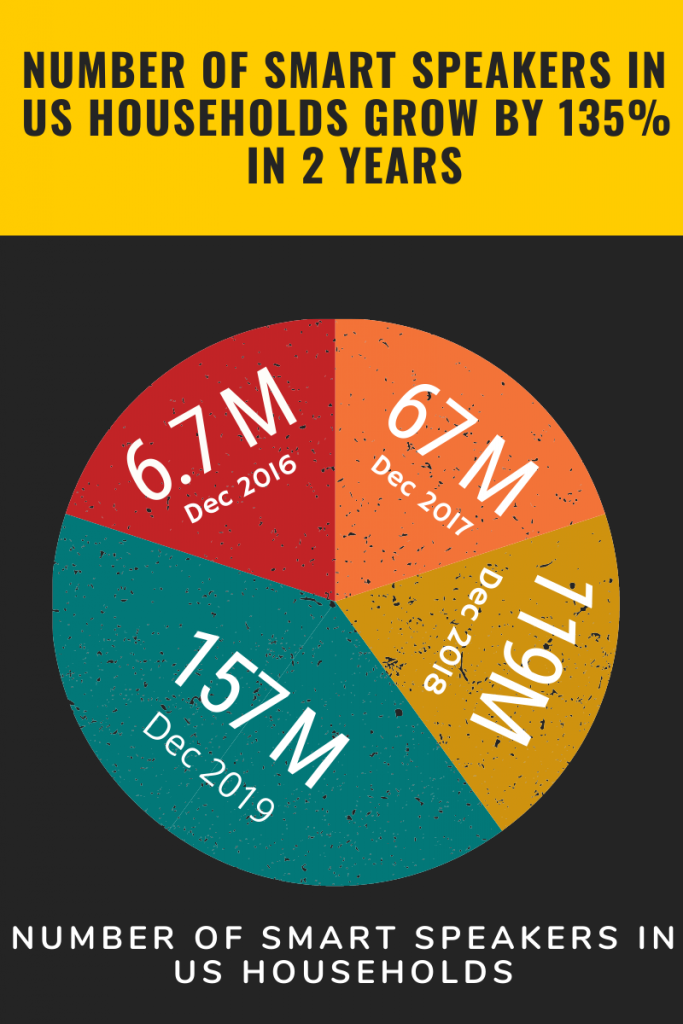200 Million+ Smart Speakers Have Been Sold But They Aren’t Yet a Marketing Channel. Why So?
Is this an abundance of care or an absence of creativity?
In 2019, 147 million smart speakers were sold all around the world. These sales were 70% higher than the 2018 calculation, as shown in the new data coming from the Strategy Analytics. According to the firm, Amazon held on to the market share crown by 26.2%, which was first 33.7% in the previous year. This was subsequent to Google which had 20.3%, which fell from 26% in last year.
Apple Number 6 Google Number 2
3 Chinese makers went after Google and lastly, Apple was in 6th place which had a share of below 5% (4.7%). Despite the increasing privacy concerns, the Q4 device shipments went to 55.7% million items, which according to Strategy Analytics, was a big record on a quarterly basis. Q4’s Shipments and sales had a retrieval as observed by Google.

Numbers Everywhere
A different analyst firm named Canalys, predicted in the beginning of the year, that the Smart speaker’s industry will surge to 150 million items in 2020. On the other hand, Consumer Intelligence Research Partners estimated earlier (in August) that the magnitude of the US Smart speakers’ market was below 80 million items. But in January, Edison evaluated that the installed foundation of Smart speakers in the US industry was almost 160 million times, which is predicted from the research data and maybe too high resultantly.
A minimum of 200 million Smart speakers and displays have been sold globally at the end of the previous year. Irrespective of the accurate figure, there are many such devices in the homes.

A Great Mystery
The Mystery with this big and still increasing base is that smart speakers are not used as a marketing channel. A few people might talk about the cliche “early days” but it is not enough to describe the reason.
Amazon launched Echo in 2014 which is approximately 6 years ago. At the beginning of 2019, Amazon declared above 100 million Alexa-powered devices which were sold. Presently, there are above 100,000 Alexa skills which include no breakout hits.
No usage information, third-party PR, and behavioral data from brands (such as Walmart) have been recorded on the platforms which can offer us knowledge into the real usage. We have many surveys that declare that Smart speakers are utilized for search and commerce. However, we have no idea how good these surveys are aligned to the behavior.
Smart displays and Smart speakers are two unique devices, although they are both operated by voice. All types of search and commerce choices are present in the Smart displays with touchscreens. This is similar to tablets but this is not where the market’s volume stands. Many sales of devices are of cheap priced units such as Google Home Mini and Echo Dot, without the touchscreens.
The Possible Monetization Cases
Many marketing and monetization cases can be appeared by only viewing the devices without touchscreens, like:
- Audio ads: Many choices are available in this aspect
- Reordering, such as Walmart groceries, which can expand to different loyalty cases; I usually order from, etc.
- Reservations or booking might need a signed in loyalty relation.
When it comes to indirect monetization, there are confirmed local search use scenarios and different advertisement lookups that can initiate offline conversion paths. This does not directly engage with advertisements. Moreover, many hybrid devices use scenarios that involve the initiative of a lookup on another device and are finished by voice on a smart speaker and vice versa.
A person can imagine a variety of uses to maintain or refine the customer service such as Marriott placing Alexa devices in the hotel rooms. One can also imagine voice skills or apps for these devices that maintain and form brand awareness. But many of these things have not yet occurred or are not occurring with satisfaction.
Why Do We Need To Care?
Is it care or an absence of imagination and creativity? It is paradoxical why we are not able to see satisfactory data and case studies and PR analysis on these things. We are only observing the device’s sales. Both marketers and brands probably know that they should form voice Smart speakers experience. These experiences should not be mostly regarding freshness but should be helpful. Maybe this is the point making them cautious.
However, there is a big chance which is not being created and its reason is vague.
Was this article helpful?
Support us to keep up the good work and to provide you even better content. Your donations will be used to help students get access to quality content for free and pay our contributors’ salaries, who work hard to create this website content! Thank you for all your support!
Reaction to comment: Cancel reply